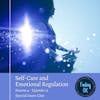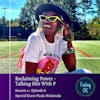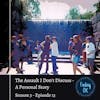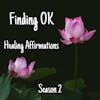"Toxic"
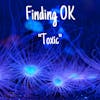
In this episode I talk about why it's so important to find a way to release tension after prolonged periods of stress, and then I discuss our growing use of the word"toxic" to describe people and relationships and how it might be clouding our ability to identify and call out abuse.
Tw/Cw: PTSD, abuse, and domestic violence.
Article
https://cerebral-sexuality.com/2018/07/31/toxic-relationships-vs-abusive-relationships/
Why Does He Do That - Book
https://www.goodreads.com/book/show/224552.Why_Does_He_Do_That_
0:00 Hecate
Hi there, thank so much for joining me. I’m Hecate, and this is Finding Ok, a healing podcast for survivors of sexual assault and any and all abuse. Today I’d like to talk about our use of the term “toxic” as in “toxic person” and “toxic relationship”. I don’t think we’re using it as consciously as we could be.
0:25 *Intro music by Ramshackle Glory*
0:37 Hecate
I hope everyone has been taking good care of themselves lately, it’s been an incredibly surreal and stressful stretch of time post-election day. And now it’s time for…
0:48 *sound of singing bowl being struck*
0:51 Hecate
Trigger and content warnings for this episode include the following: PTSD, abuse, and domestic violence. Please check in with yourself and make sure you’re all right to continue.
1:03 Hecate
Something I want to mention is that it’s important to allow yourself to release tension. Find healthy ways to do that. If you don’t have that, you have got to find it. I’m not kidding. I’m serious. For your health and well being as a human in a body, find healthy ways to release tension physically. There are loads of ways to do that. Dance is wonderful and I highly suggest it. It’s very cathartic and humans have recognized that since the dawn of time, it has often been a part of our rituals across cultures for a very good reason. Honestly, dance deserves its own episode. But besides dance another good thing to do is just wiggle, just fuckin wiggle with it. If you have tension just wiggle your whole body, doesn’t matter how it looks, it’s good for you. Movement is so important.
2:00 Hecate
Something fascinating I learned from Eliot is something I witnessed living in the forests of New England but never fully understood. When deer have been startled, when their bodies have been placed in that survival mode and the herd flees– when they’re safe they all run around and spaz out and act very silly to release that tension and get their nervous systems out of that hyper drive. I’ve seen deer acting like huge dorks in my yard but I didn’t understand what they were doing, it looked like play but it serves a very important purpose. It’s bad for stress to build up in the body for too long and when we’ve been stuck in a high-stress situation for any extended period of time, it’s important to provide yourself with a release to get your body to let go of all that tension and give it a tip that it can stop releasing all those super intense chemicals now!
3:00 Hecate
It should be said that if you have PTSD your ability to shift between your sympathetic nervous system and your parasympathetic nervous system, that’s your survival mode and your rest and digest mode, has been disrupted. Folks that have PTSD often struggle with hypervigilance, that’s when you’re on red alert constantly. Your mind and your body have those red lights flashing and that emergency siren blaring constantly telling you that it’s time for battle stations and there’s Klingons off the starboard bow even though there aren’t. You’re just trying to eat lunch, go about your day, or run routine diagnostics in engineering. That’s as nerdy as I’ll get this episode I promise. I want to say, if that’s where you’re at, stuck in hypervigilance, you can get out of it. I did. I know lots of other survivors that have as well.
4:00 Hecate
It is possible and there’s a light at the end of the tunnel. It doesn’t always have to be this way. It takes time, and it takes work and treatment. What kind of treatment is best for you depends entirely on you and your history, and you can discuss that with your Dr or your therapist. I’ll continue to talk to survivors on this podcast so you can hear from different folks. I wanted to mention that because if you struggle with hypervigilance it might be frustrating to hear me say, “Yeah! Just prance around like a fuckin deer in your kitchen and you’ll feel better!” It will help, sure, but there is a bigger problem and I do want to acknowledge that. Releasing tension through some kind of movement or release is a very healthy habit to nurture regardless though and I highly suggest it. Just putting on your favorite song and jumping around goes a long way.
5:00 Hecate
That bring me to something else I want to mention in these times, and that’s the importance of celebration. Taking time out to celebrate the small victories is incredibly important. My partner and I sat out on the balcony the other day and shared some champagne as the sun went down. We toasted to what’s hopefully the turning of the tide. Yes, there’s still work to do. No, this isn’t a magical, perfect, neat and tidy solution to everything. But you have to pause to celebrate important moments and breakthroughs along the way in order to keep going. You can apply that to politics and large-scale situations, or you can apply that to small moments in your daily life. Create space for the celebration of success, learning, and improvements.
5:57 Hecate
*makes sound of tires screeching* subject change! When toxic organisms show up in nature it’s usually for two main reasons, and those are predation and defense. In order for a lifeform to survive by preying on other lifeforms or to protect itself from being preyed upon or harmed. The toxins many of these lifeforms produce vary widely in their effects and most of them are only deadly to us in large quantities. Considering how many organisms are on the planet, it’s interesting how few of them can actually pack such a punch that they can take a human out with their natural dosage of kickass. There are quite a few of these substances humans have chosen to interact with to their benefit, whether in minute doses as medicine, to aid them in hunting, or to consume recreationally. The key point is that “toxic” does not simply mean “bad” the way we’ve started using it.
7:00 Hecate
It’s more complex and when we start using it that way to talk about people or relationships, it’s helpful to consider the conceptual richness of the word. Monarch butterflies are beautiful to us because of their distinctive pattern and brilliant color, but this color is actually warning its potential predators that it’s toxic. The butterfly isn’t bad, the milkweed it ate as a caterpillar to make itself toxic isn’t bad either, but it’s bad for the bird that might eat it. Eliot and I have touched upon this subject in our conversations and I wanted to bring it up again and flesh it out a bit more. Can people be toxic? I think people can be abusive, and I think some people are assholes. *laugh* But those are things I think we need to be specific about and that we need to be more willing to be specific about.
7:56 Hecate
My concern is that it seems like these terms for people and for relationships are obscuring the conversation about abuse. I think there’s a lot of opportunity in the word “toxic” to add nuance and to better understand interpersonal relationships and needs, but instead I see it getting thrown around and becoming the new version of “bitches be crazy” a massively unhelpful phrase *laugh* that cis men classically use to undermine and invalidate women’s feelings, experiences, and responses. When I think of calling a person “toxic” I think of a person who has a lot of work to do, who is refusing to do it and who is making other people pay for it if they get within range. There’s autonomy there though, there’s that choice in who you are and whether or not you improve and work on your own shit.
8:55 Hecate
I was chatting about it with my partner and riding out more metaphors and using sea anemones as an example, and he said he’s really not interested in whether or not there’s autonomy involved. He just doesn’t want to go near that fucking sea anemone. Fair. *laugh* I love something that Eliot says about toxic relationships, she looks at it through the lens of landscaping. She offered the metaphor of a cactus being planted in a rainforest or a fern being planted in a desert. None of those things are bad in and of themselves, but they’re bad for each other. That’s the important part. When I think of toxic relationships I think of poor compatibility as a spectrum and a toxic relationship being on one end of that spectrum, where the personal work that both people have to do combines in the worst way. Or, simply people giving their time, their labor, and energy to someone who cannot reciprocate in the way that the other person needs.
10:02 Hecate
Neither person does well and it can bring out less than stellar qualities in everyone involved. Using that plant metaphor again, it’s trying to grow roots where roots won’t grow well. When it comes to abuse though, the major defining difference is control and power. A question that sort of hangs out there is, does the harm being inflicted have to be consciously inflicted? Does it have to be intentional for it to be abusive? I think the biggest reason I hesitate coming down on this is because so many of us want to believe it wasn’t intentional, that it was stemming from the subconscious and they didn’t understand what they were doing. It’s scary. I’m not making a hard statement that it has to be 100% conscious and intentional in order to be abuse.
10:57 Hecate
But in the episode notes I’ll attach an article that references studies on this, I’ll find more on the research for future episodes. Domestic abusers (in this case cis men) in prisons have been interviewed and studies show that most of them admit to being very conscious about what they were doing. When put in groups and asked how long it was best to wait before beginning the physical abuse of their partner in order to make them feel secure, invested, and ultimately trapped in the relationship, the abusers conferred with each other and came up with an answer. I won’t quote it because I can’t recall. But they had an answer, they plan this shit. It’s predatory. Not in the terms I mentioned earlier, predation in nature is generally eating to survive. They don’t get to hang out in the moral neutrality that an animal gets. They’re human beings. Once they were there in prison and the game was over, they admitted it openly to each other where they felt comfortable.
12:04 Hecate
There was no more, “I’m so sorry babe, I didn’t know what I was doing, I just lost control” They admitted to planning when to lose control…and if it’s planned it’s not a loss of control, it’s just terrorizing someone. An abuser will often cut you off from others slowly, play psychological games, put themselves more and more into a position of control over various aspects of your life, and exert power over you. It’s hell and they know it. I want us to call it what it is, it’s abuse. If it’s abuse, call it abuse, don’t call it toxic.
12:53 Hecate
It’s entirely possible to just be an asshole *laugh* without being an abuser. It’s possible to be a petty and mean person without being an abuser. It’s possible for a relationship to be really shitty, and to bring out the worst in people without it being abusive. I think there’s a lot of room to talk about those things and we should. There’s lots of room with the word “toxic” to explore our various needs, communication styles, patterns of behavior, love languages, personality types, and the personal work we need to do. However you want to say it, those are things that matter in any kind of relationship whether it’s romantic or not. After Eliot broached the subject now whenever I hear the word, “toxic” being used I see an X on a map. Dig here! There’s more beneath the surface. So, really what I’m saying is - get curious. How are you currently using this term? Are you using it mindfully? What does it mean to you?
14:05 Hecate
Today was more about exploring this more, there’s no solid stance or perfectly polished thesis, it’s more of a continuing conversation. Thank you so much for listening, please join me next week when I’ll be bring you a very special episode. Please write in with feedback, listener questions or episode requests to podcast.findingok@gmail.com. Let me know if you're interested in joining me on the show. I would love to have you. Finding OK is crowd funded and paid for out of pocket. I am unemployed and anything helps. You are the ones helping me make this happen. Thank you. A link to the Go Fund Me can be found on the brand new podcast website www.finding-ok.com and I post links routinely on my Facebook page. I also post relevant articles, art, memes, and resources daily. Feel free to friend me, Hecate F. Okay. *spells name* You can also find me on Instagram. I have created a private Finding OK Facebook group for survivors. You are welcome there and I hope you'll join us. Please take a minute to rate and review the podcast to help me reach more listeners. Reviews are featured on the new website and you get a shout out on the next episode! Thank you so much for your continued support. Please share, subscribe, and donate if you can. Thank you again for listening. This has been Finding OK. Black Lives Matter. Take care of yourself.
15:50 *Outro music by Ramshackle Glory*
*fade in to folk/punk chords of guitar* Your heart is a muscle the size of your fist. Keep on loving. Keep on fighting. And hold on, and hold on, hold on for your life *echoes into brief silence*…(Chorus and full band) Your heart is a muscle the size of your fist. Keep on loving. Keep on fighting. And hold on, and hold on, hold on for your life. *triumphant and uplifting music plays till end*
























